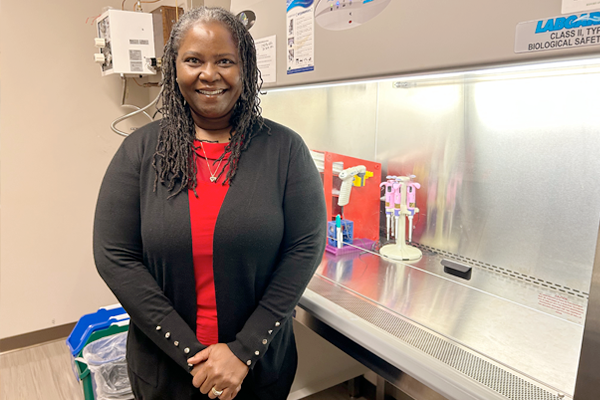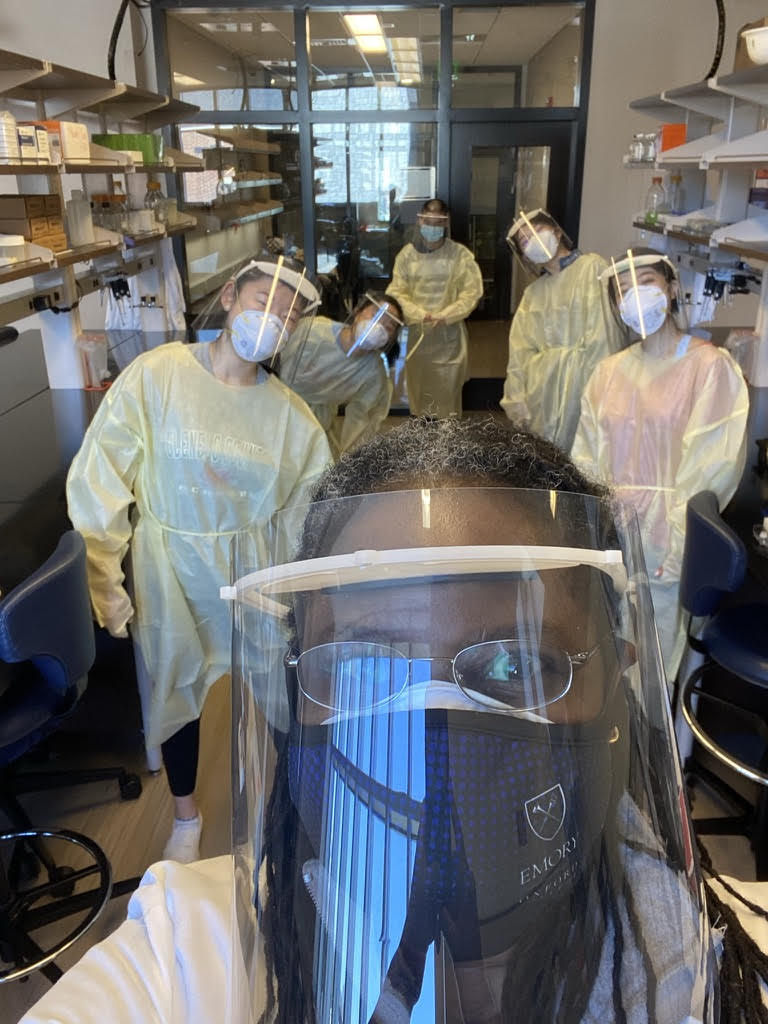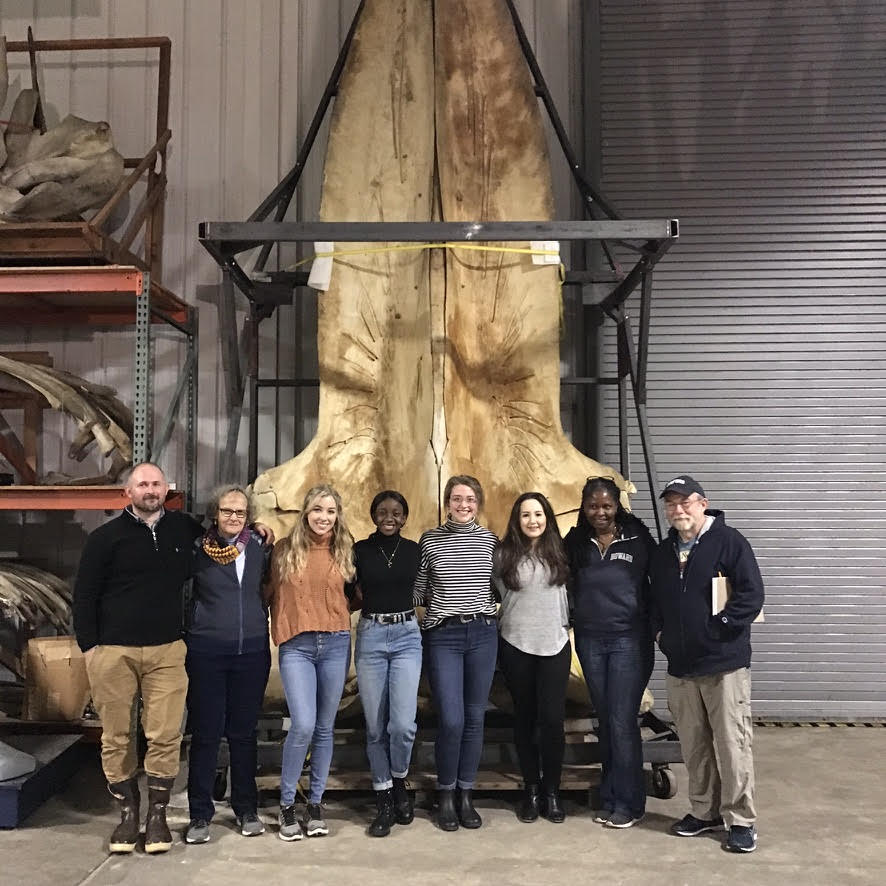Faculty Spotlight: LaTonia Taliaferro-Smith

Students tackle scientific challenges with mentor LaTonia Taliaferro-Smith.
Oxford News sat down with LaTonia Taliaferro-Smith, associate teaching professor of biology and director of undergraduate laboratories at Oxford College, to learn more about what motivates her work as a cancer researcher, educator, and mentor.
Oxford News: You have made tremendous strides in triple-negative breast cancer research, specifically in the treatment for African American women. Have you always wanted to study science?
Latonia Taliaferro-Smith: When I was just six, a visit to my pediatrician changed everything. He was one of few Black doctors in my hometown of Mobile, Alabama. When I visited his office, I was fascinated by his posters of the inside of the human body. I looked forward to my visits and began asking questions. I never stopped.
In her pursuit of new knowledge, LaTonia Taliaferro-Smith seeks to help scientists working to develop treatments triple-negative breast cancer, a difficult to treat cancer that disproportionately affects African American women. By increasing the number of African American cell lines available for study, treatment options and outcomes have improved. Now, she continues to inspire her students to conduct research. 
Oxford News: When did simple curiosity shift to a driving quest for answers on triple negative breast cancer, a disease that accounts for 10-15 percent of all breast cancers?
LTS: Before I completed my PhD in 2004 at Howard University, my husband’s sister was diagnosed with breast cancer. At the time, approximately 95 percent of what was known about cancer was based on Caucasians. I wanted to change that fact.
Oxford News: You cherish your role as a mentor for Oxford’s Black Girl Processing Space, a staff-led initiative designed to support Black women on campus. You founded SciOx Magazine to encourage student publication of research. You lead young researchers in your independent discovery and research in biology course, which focuses on breast cancer.
LTS: I am deeply passionate about the benefits of early-college research opportunities and how those opportunities can have a positive impact on career trajectories. I didn’t have experiences like this until I was a graduate student. Research teaches them how to approach problems more creatively. Students face a research learning curve once they reach graduate school, so by getting these students engaged earlier, they have an easier path.
Oxford News: Challenge isn’t new to you. As a first-generation college student, you’ve earned the highest degree of anyone in your family. How does that impact the way you interact with your students?
LTS: Mentorship is one of the most important parts of my job. I had to navigate and figure out challenges, and I try to create space for students to do the same. From their perspective, it looks like we have everything together, but it’s oftentimes very comforting for them to see and hear that faculty have had struggles of their own.
Oxford News: Your curiosity extends to a variety of areas, including whalebones. What can you tell us about this peculiar Oxford Science Building artifact?
LaTonia Taliaferro-Smith, pictured above with her students and the Smithsonian Fossil Marine Mammals team members. For Summer 2026, as Oxford's new Summer Program Coordinator, she will work in collaboration with the offices of Academic Affairs, Campus Life, and Events and Conferences, to develop innovative residential and full-day summer programs for groups such as high school students, incoming first-year students, and international students. She also will develop national and global programs for faculty and staff and for lifelong learners in the community. 
LTS: The whalebone has helped my team of student researchers learn valuable lessons about research methodology. It sat in storage until we drilled into it for a sample. The students determined the bone was 507 years old. They traveled to the Smithsonian Institution to work with Oxford alumnus Dr. Nick Pyenson, Lead Curator of the Smithsonian Fossil Marine Mammals and compared the bone to archival specimens.
Oxford News: Do you enjoy working with your students?
LTS: I love my students and learn from them. They bring such rich cultures and experiences to Oxford. This community is supportive of just about everything that I put out there and want to do. We’re all here to benefit our students.
Oxford News: Thanks, LaTonia!
LTS: I strongly believe in the transformative power of early research opportunities. By supporting student-faculty collaborative research, we empower the next generation of innovative scientists who not only push the boundaries of scientific discovery but also create meaningful change in their communities. Our contribution as mentors can help provide critical research experiences that shape students' academic and professional trajectories, ensuring that diverse perspectives and groundbreaking research continue to thrive.
At Oxford College, we are continually expanding student horizons. Through your support for 2O36, we can create an endowed fund for student-faculty collaborative research so that more Oxford students can access valuable research opportunities. Learn more how you can become a changemaker today.
2O36 inspires investment in people for the benefit of people, bringing the Emory community together to build on our mission to serve humanity through knowledge.